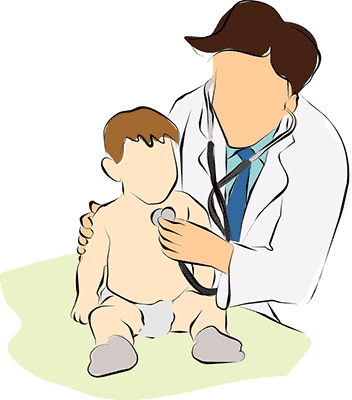Pediatric Referrals


Pediatric murmurs can be innocent or require referral. This course aims to improve your auscultation skills and decisions-making for pediatric heart murmurs. The cases include patient history, a heart sounds auscultation page and a decision page.
Cardinal Clinical Signs
There are six cardinal clinical signs on cardiac examination which prove to be significant independent predictors of the presence of a confirmed cardiac lesion. The six signs are the following:
- A murmur of intensity 3 or greater.
- The murmur is best heard at LUSB (2LICS).
- The murmur is of harsh quality.
- The murmur is pansystolic.
- The presence of a systolic click.
- The presence of an abnormal second heart sound (fixed splitting with respiration).
Course Completion Certificate
Upon completing all cases within this course (during one session), you will be able to print a course completion certificate.
Begin Course
How To Use Course Lessons
Each lesson consists of multiple pages: text description with audio recording and dynamic waveform pages. Some lessons include a cardiac animation and exercises pages. To view these lesson pages, use the tabs which appear above each lesson's content.Using this course
Lessons
Lesson #1: 4-month-old girl failure to thrive
4-month-old female infant. Mother concerned about not meeting goals for child's age. History of sudden death in family. Mother wants complete workup.
Lesson #2: 6-month-old boy
6-month-old male infant. Well baby visit. Child is in middle range for weight and height. No obvious abnormalities.
Lesson #3: 4-year-old with fainting episode
4-year-old girl has been having dizzy spells. Most recent was followed by a fainting episode. Has complained of heart palpitations.
Lesson #4: 10-year-old with chest pain.
10-year-old boy experiencing periodic non-exertional chest pain. Discomfort is sometimes associated with inspiration. Experiencing periodic palpitations.
Lesson #5: 6-month-old with poor appetite
6-month-old girl with poor appetite and shortness of breath.
Lesson #6: 12-year-old boy with respiratory infections
12-year-old boy complains of headaches and periodic nose bleeds. Blood pressure elevated. History of frequent respiratory infections.
Lesson #7: Twelve-year-old girl with periodic dizziness
Twelve-year-old girl complaining of periodic dizziness during soccer practice. Frequent panic attacks with rapid heart beat.
Lesson #8: Eleven-year-old girl seen after bicycle accident
Eleven-year-old girl with two centimeter laceration on the right knee requiring four sutures
Lesson #9: Eight-year-old girl with elevated temperature
Eight-year-old girl 102 fever unresponsive to alcohol sponging.
Lesson #10: Eight-year-old boy with generalized malaise
Eight-year-old boy with lack of appetite, low energy, crying, doesn't play with friends.
Lesson #11: Fifteen-year-old boy complains of dizziness
Fifteen-year-old boy complains of dizziness during soccer practice.
Authors and Reviewers
-
Heart sounds by Dr. Jonathan Keroes, MD and David Lieberman, Developer, Virtual Cardiac Patient.
- Lung sounds provided by Diane Wrigley, PA
-
Heart sounds mentorship by W. Proctor Harvey, MD>
- Reviewed by Dr. Barbara Erickson, PhD, RN, CCRN.
-
Last Update: 12/14/2022
Sources
-
Heart Sounds and Murmurs Across the Lifespan (with CD)
by Dr Barbara Ann Erickson
Publisher: Mosby
ISBN-10: 0323020453; ISBN-13: 978-0323020459 -
Heart Sounds and Murmurs: A Practical Guide with Audio CD-ROM 3rd Edition
Elsevier-Health Sciences Division
Barbara A. Erickson, PhD, RN, CCRN -
Heart Sounds Made Easy with CD-ROM: (with CD-ROM) 2nd Edition
Anthony P. Salmon
ISBN-13: 978-0443069079 - NCBI Review of Heart Sounds and Murmurs: A Practical Guide
-
The Virtual Cardiac Patient: A Multimedia Guide to Heart Sounds And Murmurs
Jonathan Keroes, David Lieberman
Publisher: Lippincott Williams & Wilkin)
ISBN-10: 0781784425; ISBN-13: 978-0781784429 -
Ventricular Function Curves in the Exercising Dog
JONATHAN KEROES , ROGER R. ECKER , and ELLIOT RAPAPORT
Circulation Research, Vol. 25, No. 5 -
Electrocardiographic changes associated with ritodrine-induced maternal tachycardia and hypokalemia
American Journal of Obstetrics Gynecology, VOLUME 154, ISSUE 4, P921-923, APRIL 01, 1986
Susan K Hendricks, MD, Jonathan Keroes, MD, Michael Katz, MD -
A Multimedia Guide to Heart Sounds and Murmurs
January 2007 JAMA The Journal of the American Medical Association 297(2):217-218
DOI:10.1001/jama.297.2.217. M. Saleem Seyal, MD, Reviewer - Clinical Heart Disease
W Proctor Harvey, MD
Laennec Publishing; 1st edition (January 1, 2009)